A Comprehensive Report: Hospitality Consumer Behaviour and Insight
VerifiedAdded on 2021/02/19
|12
|4118
|509
Report
AI Summary
This report delves into the multifaceted aspects of consumer behavior within the hospitality sector, examining the various cultural, social, personal, and psychological factors that shape consumer attitudes and decision-making processes. It explores the impact of digital technology on evolving consumer trends, including the adoption of technologies like facial recognition and AI-powered chatbots, and their influence on brand trust and customer experiences. The report outlines the stages of the consumer decision-making journey, from problem recognition to post-purchase evaluation, emphasizing the importance of marketers mapping the path to purchase to understand and influence consumer behavior. It also highlights the key differences between B2B and B2C decision-making in the hospitality context and discusses various market research approaches used to gain insights into consumer behavior. Finally, the report examines how marketers can strategically influence each stage of the consumer decision-making process to enhance customer satisfaction and drive business growth within the hospitality industry.
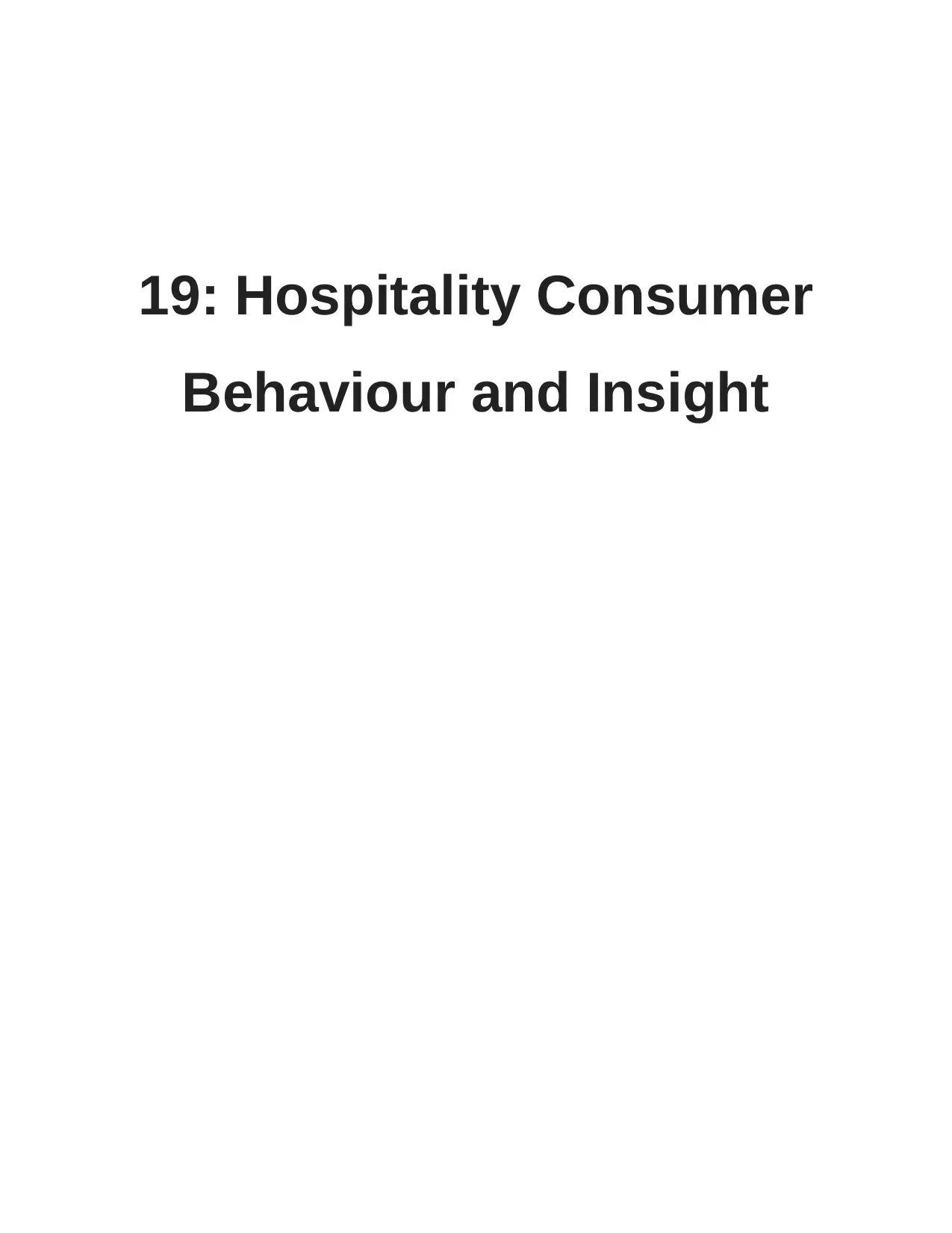
19: Hospitality Consumer
Behaviour and Insight
Behaviour and Insight
Paraphrase This Document
Need a fresh take? Get an instant paraphrase of this document with our AI Paraphraser
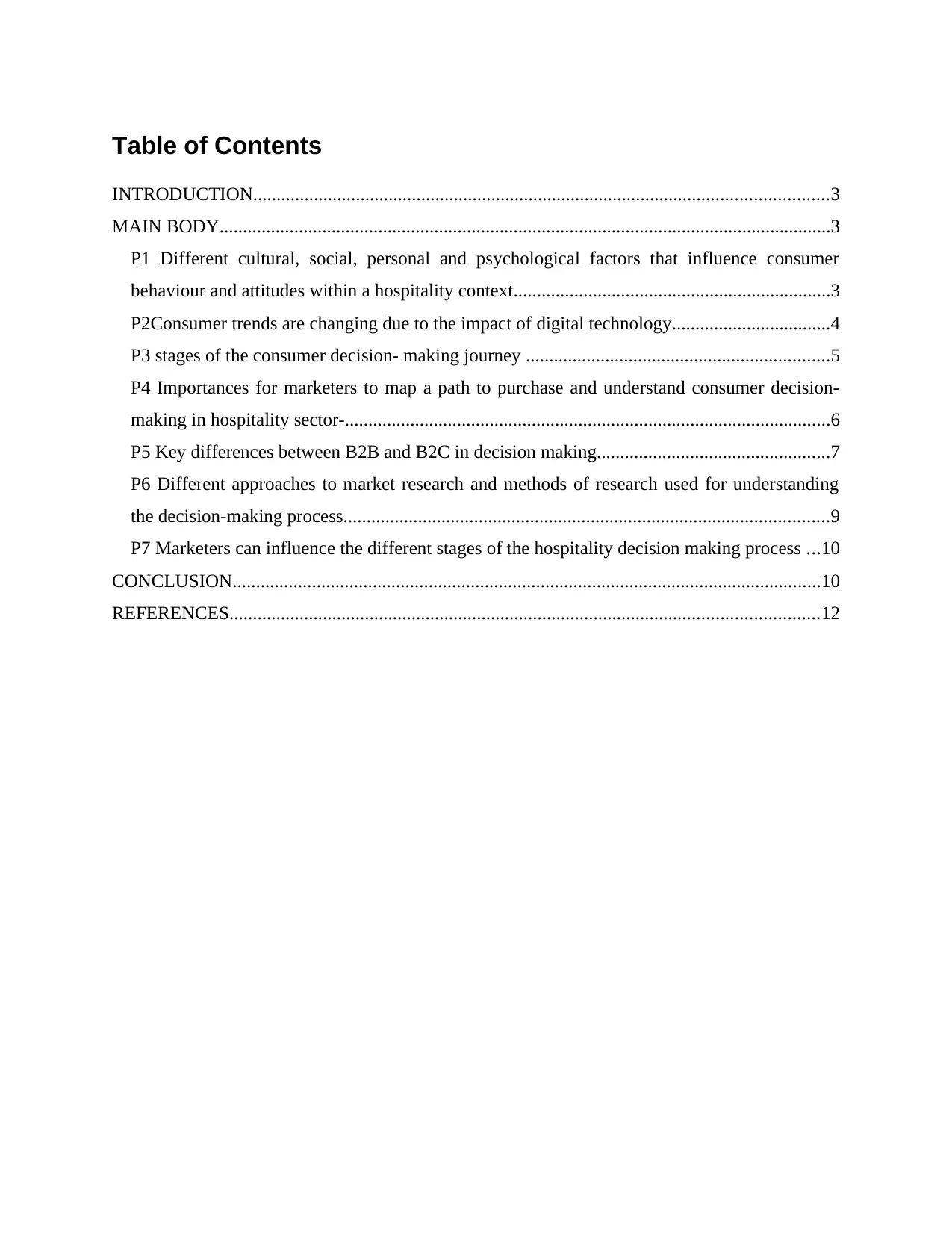
Table of Contents
INTRODUCTION...........................................................................................................................3
MAIN BODY...................................................................................................................................3
P1 Different cultural, social, personal and psychological factors that influence consumer
behaviour and attitudes within a hospitality context....................................................................3
P2Consumer trends are changing due to the impact of digital technology..................................4
P3 stages of the consumer decision- making journey .................................................................5
P4 Importances for marketers to map a path to purchase and understand consumer decision-
making in hospitality sector-........................................................................................................6
P5 Key differences between B2B and B2C in decision making..................................................7
P6 Different approaches to market research and methods of research used for understanding
the decision-making process........................................................................................................9
P7 Marketers can influence the different stages of the hospitality decision making process ...10
CONCLUSION..............................................................................................................................10
REFERENCES..............................................................................................................................12
INTRODUCTION...........................................................................................................................3
MAIN BODY...................................................................................................................................3
P1 Different cultural, social, personal and psychological factors that influence consumer
behaviour and attitudes within a hospitality context....................................................................3
P2Consumer trends are changing due to the impact of digital technology..................................4
P3 stages of the consumer decision- making journey .................................................................5
P4 Importances for marketers to map a path to purchase and understand consumer decision-
making in hospitality sector-........................................................................................................6
P5 Key differences between B2B and B2C in decision making..................................................7
P6 Different approaches to market research and methods of research used for understanding
the decision-making process........................................................................................................9
P7 Marketers can influence the different stages of the hospitality decision making process ...10
CONCLUSION..............................................................................................................................10
REFERENCES..............................................................................................................................12
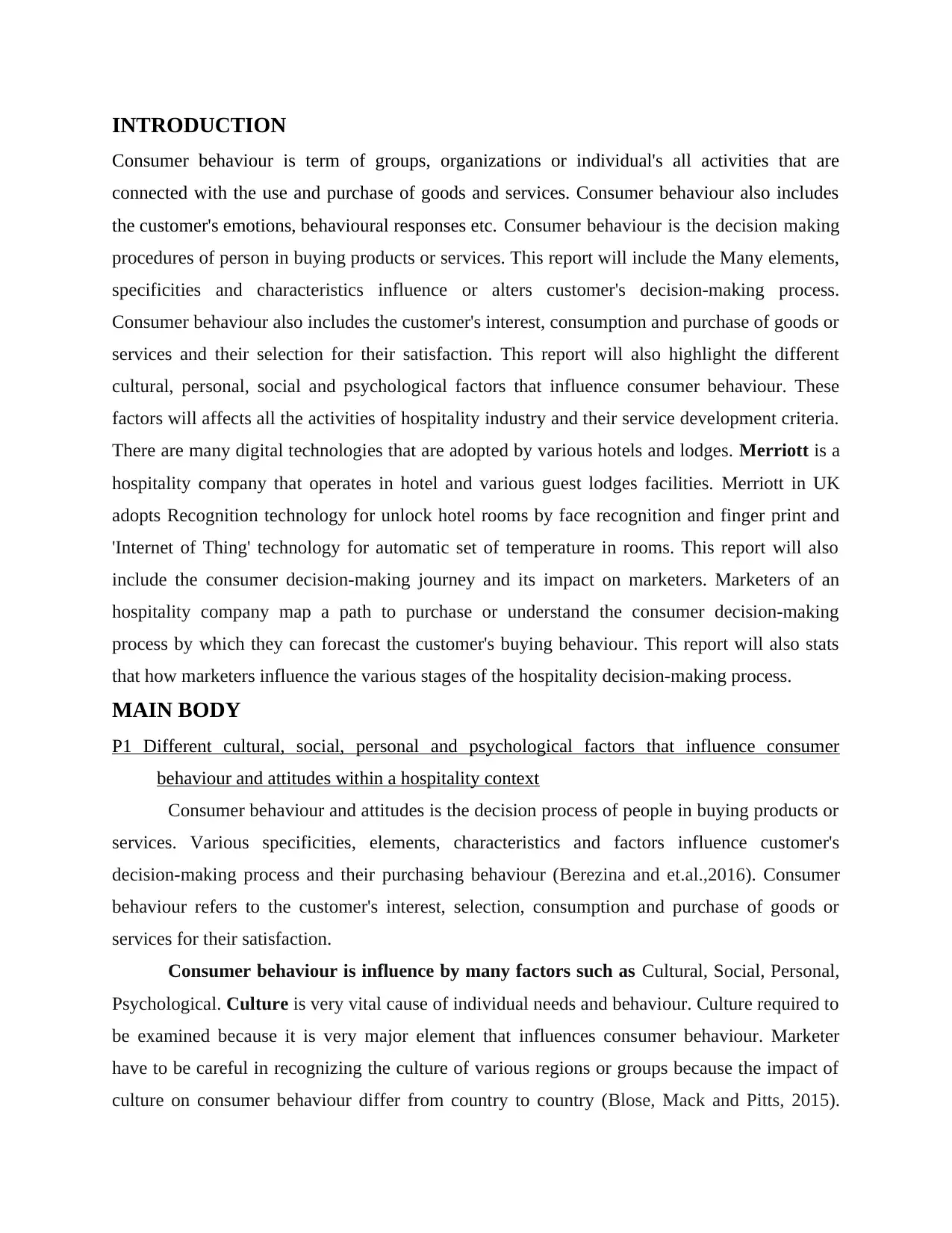
INTRODUCTION
Consumer behaviour is term of groups, organizations or individual's all activities that are
connected with the use and purchase of goods and services. Consumer behaviour also includes
the customer's emotions, behavioural responses etc. Consumer behaviour is the decision making
procedures of person in buying products or services. This report will include the Many elements,
specificities and characteristics influence or alters customer's decision-making process.
Consumer behaviour also includes the customer's interest, consumption and purchase of goods or
services and their selection for their satisfaction. This report will also highlight the different
cultural, personal, social and psychological factors that influence consumer behaviour. These
factors will affects all the activities of hospitality industry and their service development criteria.
There are many digital technologies that are adopted by various hotels and lodges. Merriott is a
hospitality company that operates in hotel and various guest lodges facilities. Merriott in UK
adopts Recognition technology for unlock hotel rooms by face recognition and finger print and
'Internet of Thing' technology for automatic set of temperature in rooms. This report will also
include the consumer decision-making journey and its impact on marketers. Marketers of an
hospitality company map a path to purchase or understand the consumer decision-making
process by which they can forecast the customer's buying behaviour. This report will also stats
that how marketers influence the various stages of the hospitality decision-making process.
MAIN BODY
P1 Different cultural, social, personal and psychological factors that influence consumer
behaviour and attitudes within a hospitality context
Consumer behaviour and attitudes is the decision process of people in buying products or
services. Various specificities, elements, characteristics and factors influence customer's
decision-making process and their purchasing behaviour (Berezina and et.al.,2016). Consumer
behaviour refers to the customer's interest, selection, consumption and purchase of goods or
services for their satisfaction.
Consumer behaviour is influence by many factors such as Cultural, Social, Personal,
Psychological. Culture is very vital cause of individual needs and behaviour. Culture required to
be examined because it is very major element that influences consumer behaviour. Marketer
have to be careful in recognizing the culture of various regions or groups because the impact of
culture on consumer behaviour differ from country to country (Blose, Mack and Pitts, 2015).
Consumer behaviour is term of groups, organizations or individual's all activities that are
connected with the use and purchase of goods and services. Consumer behaviour also includes
the customer's emotions, behavioural responses etc. Consumer behaviour is the decision making
procedures of person in buying products or services. This report will include the Many elements,
specificities and characteristics influence or alters customer's decision-making process.
Consumer behaviour also includes the customer's interest, consumption and purchase of goods or
services and their selection for their satisfaction. This report will also highlight the different
cultural, personal, social and psychological factors that influence consumer behaviour. These
factors will affects all the activities of hospitality industry and their service development criteria.
There are many digital technologies that are adopted by various hotels and lodges. Merriott is a
hospitality company that operates in hotel and various guest lodges facilities. Merriott in UK
adopts Recognition technology for unlock hotel rooms by face recognition and finger print and
'Internet of Thing' technology for automatic set of temperature in rooms. This report will also
include the consumer decision-making journey and its impact on marketers. Marketers of an
hospitality company map a path to purchase or understand the consumer decision-making
process by which they can forecast the customer's buying behaviour. This report will also stats
that how marketers influence the various stages of the hospitality decision-making process.
MAIN BODY
P1 Different cultural, social, personal and psychological factors that influence consumer
behaviour and attitudes within a hospitality context
Consumer behaviour and attitudes is the decision process of people in buying products or
services. Various specificities, elements, characteristics and factors influence customer's
decision-making process and their purchasing behaviour (Berezina and et.al.,2016). Consumer
behaviour refers to the customer's interest, selection, consumption and purchase of goods or
services for their satisfaction.
Consumer behaviour is influence by many factors such as Cultural, Social, Personal,
Psychological. Culture is very vital cause of individual needs and behaviour. Culture required to
be examined because it is very major element that influences consumer behaviour. Marketer
have to be careful in recognizing the culture of various regions or groups because the impact of
culture on consumer behaviour differ from country to country (Blose, Mack and Pitts, 2015).
⊘ This is a preview!⊘
Do you want full access?
Subscribe today to unlock all pages.

Trusted by 1+ million students worldwide
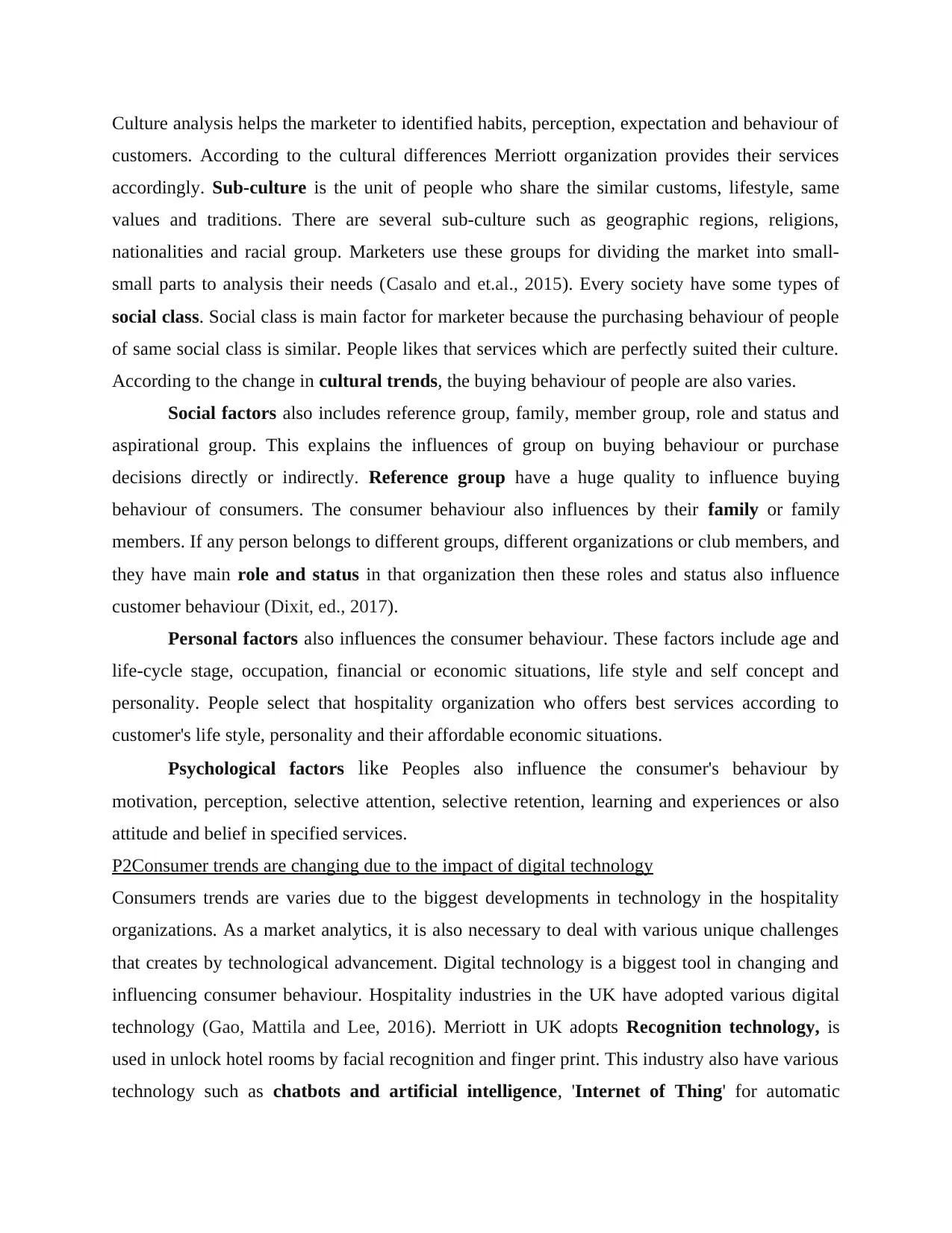
Culture analysis helps the marketer to identified habits, perception, expectation and behaviour of
customers. According to the cultural differences Merriott organization provides their services
accordingly. Sub-culture is the unit of people who share the similar customs, lifestyle, same
values and traditions. There are several sub-culture such as geographic regions, religions,
nationalities and racial group. Marketers use these groups for dividing the market into small-
small parts to analysis their needs (Casalo and et.al., 2015). Every society have some types of
social class. Social class is main factor for marketer because the purchasing behaviour of people
of same social class is similar. People likes that services which are perfectly suited their culture.
According to the change in cultural trends, the buying behaviour of people are also varies.
Social factors also includes reference group, family, member group, role and status and
aspirational group. This explains the influences of group on buying behaviour or purchase
decisions directly or indirectly. Reference group have a huge quality to influence buying
behaviour of consumers. The consumer behaviour also influences by their family or family
members. If any person belongs to different groups, different organizations or club members, and
they have main role and status in that organization then these roles and status also influence
customer behaviour (Dixit, ed., 2017).
Personal factors also influences the consumer behaviour. These factors include age and
life-cycle stage, occupation, financial or economic situations, life style and self concept and
personality. People select that hospitality organization who offers best services according to
customer's life style, personality and their affordable economic situations.
Psychological factors like Peoples also influence the consumer's behaviour by
motivation, perception, selective attention, selective retention, learning and experiences or also
attitude and belief in specified services.
P2Consumer trends are changing due to the impact of digital technology
Consumers trends are varies due to the biggest developments in technology in the hospitality
organizations. As a market analytics, it is also necessary to deal with various unique challenges
that creates by technological advancement. Digital technology is a biggest tool in changing and
influencing consumer behaviour. Hospitality industries in the UK have adopted various digital
technology (Gao, Mattila and Lee, 2016). Merriott in UK adopts Recognition technology, is
used in unlock hotel rooms by facial recognition and finger print. This industry also have various
technology such as chatbots and artificial intelligence, 'Internet of Thing' for automatic
customers. According to the cultural differences Merriott organization provides their services
accordingly. Sub-culture is the unit of people who share the similar customs, lifestyle, same
values and traditions. There are several sub-culture such as geographic regions, religions,
nationalities and racial group. Marketers use these groups for dividing the market into small-
small parts to analysis their needs (Casalo and et.al., 2015). Every society have some types of
social class. Social class is main factor for marketer because the purchasing behaviour of people
of same social class is similar. People likes that services which are perfectly suited their culture.
According to the change in cultural trends, the buying behaviour of people are also varies.
Social factors also includes reference group, family, member group, role and status and
aspirational group. This explains the influences of group on buying behaviour or purchase
decisions directly or indirectly. Reference group have a huge quality to influence buying
behaviour of consumers. The consumer behaviour also influences by their family or family
members. If any person belongs to different groups, different organizations or club members, and
they have main role and status in that organization then these roles and status also influence
customer behaviour (Dixit, ed., 2017).
Personal factors also influences the consumer behaviour. These factors include age and
life-cycle stage, occupation, financial or economic situations, life style and self concept and
personality. People select that hospitality organization who offers best services according to
customer's life style, personality and their affordable economic situations.
Psychological factors like Peoples also influence the consumer's behaviour by
motivation, perception, selective attention, selective retention, learning and experiences or also
attitude and belief in specified services.
P2Consumer trends are changing due to the impact of digital technology
Consumers trends are varies due to the biggest developments in technology in the hospitality
organizations. As a market analytics, it is also necessary to deal with various unique challenges
that creates by technological advancement. Digital technology is a biggest tool in changing and
influencing consumer behaviour. Hospitality industries in the UK have adopted various digital
technology (Gao, Mattila and Lee, 2016). Merriott in UK adopts Recognition technology, is
used in unlock hotel rooms by facial recognition and finger print. This industry also have various
technology such as chatbots and artificial intelligence, 'Internet of Thing' for automatic
Paraphrase This Document
Need a fresh take? Get an instant paraphrase of this document with our AI Paraphraser
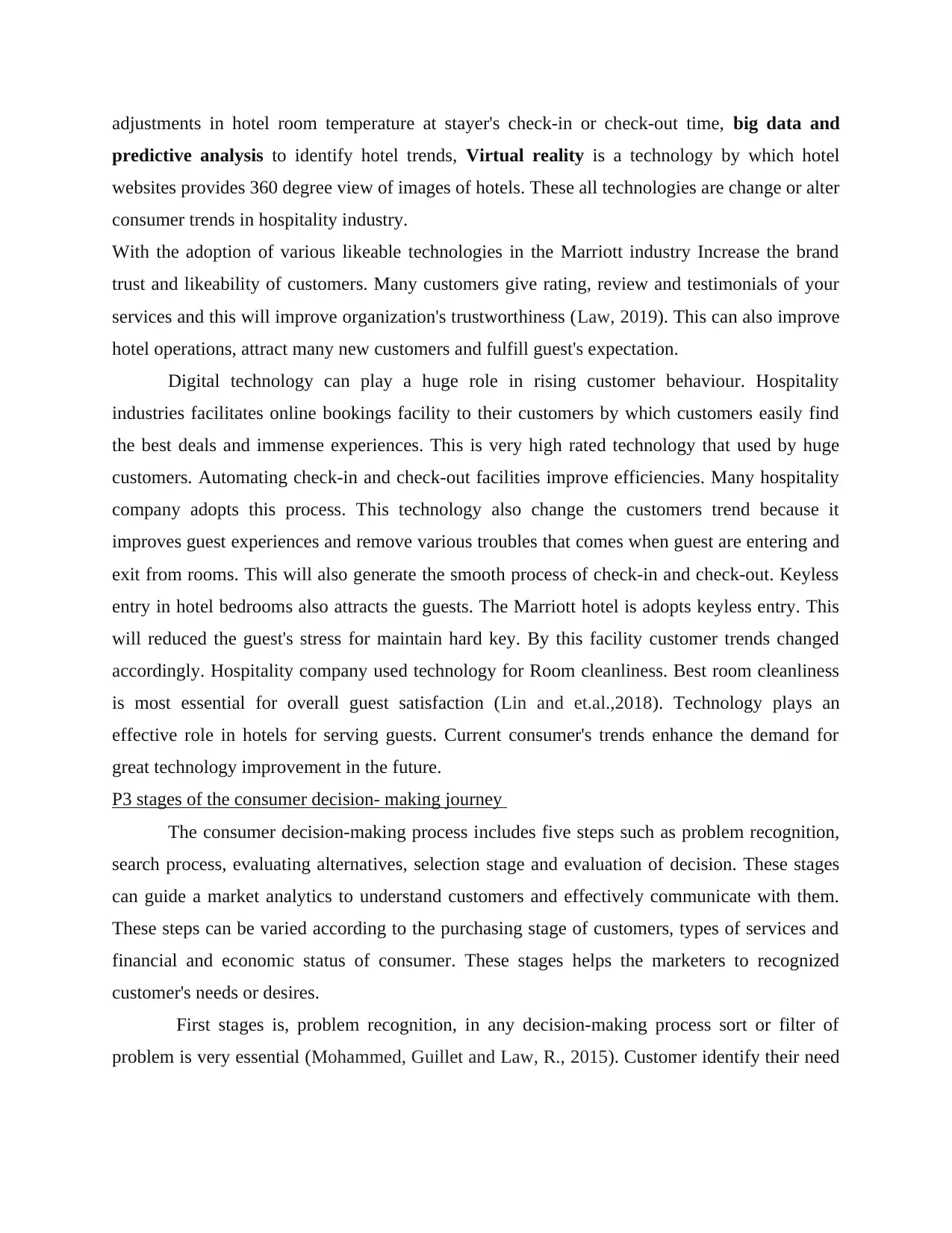
adjustments in hotel room temperature at stayer's check-in or check-out time, big data and
predictive analysis to identify hotel trends, Virtual reality is a technology by which hotel
websites provides 360 degree view of images of hotels. These all technologies are change or alter
consumer trends in hospitality industry.
With the adoption of various likeable technologies in the Marriott industry Increase the brand
trust and likeability of customers. Many customers give rating, review and testimonials of your
services and this will improve organization's trustworthiness (Law, 2019). This can also improve
hotel operations, attract many new customers and fulfill guest's expectation.
Digital technology can play a huge role in rising customer behaviour. Hospitality
industries facilitates online bookings facility to their customers by which customers easily find
the best deals and immense experiences. This is very high rated technology that used by huge
customers. Automating check-in and check-out facilities improve efficiencies. Many hospitality
company adopts this process. This technology also change the customers trend because it
improves guest experiences and remove various troubles that comes when guest are entering and
exit from rooms. This will also generate the smooth process of check-in and check-out. Keyless
entry in hotel bedrooms also attracts the guests. The Marriott hotel is adopts keyless entry. This
will reduced the guest's stress for maintain hard key. By this facility customer trends changed
accordingly. Hospitality company used technology for Room cleanliness. Best room cleanliness
is most essential for overall guest satisfaction (Lin and et.al.,2018). Technology plays an
effective role in hotels for serving guests. Current consumer's trends enhance the demand for
great technology improvement in the future.
P3 stages of the consumer decision- making journey
The consumer decision-making process includes five steps such as problem recognition,
search process, evaluating alternatives, selection stage and evaluation of decision. These stages
can guide a market analytics to understand customers and effectively communicate with them.
These steps can be varied according to the purchasing stage of customers, types of services and
financial and economic status of consumer. These stages helps the marketers to recognized
customer's needs or desires.
First stages is, problem recognition, in any decision-making process sort or filter of
problem is very essential (Mohammed, Guillet and Law, R., 2015). Customer identify their need
predictive analysis to identify hotel trends, Virtual reality is a technology by which hotel
websites provides 360 degree view of images of hotels. These all technologies are change or alter
consumer trends in hospitality industry.
With the adoption of various likeable technologies in the Marriott industry Increase the brand
trust and likeability of customers. Many customers give rating, review and testimonials of your
services and this will improve organization's trustworthiness (Law, 2019). This can also improve
hotel operations, attract many new customers and fulfill guest's expectation.
Digital technology can play a huge role in rising customer behaviour. Hospitality
industries facilitates online bookings facility to their customers by which customers easily find
the best deals and immense experiences. This is very high rated technology that used by huge
customers. Automating check-in and check-out facilities improve efficiencies. Many hospitality
company adopts this process. This technology also change the customers trend because it
improves guest experiences and remove various troubles that comes when guest are entering and
exit from rooms. This will also generate the smooth process of check-in and check-out. Keyless
entry in hotel bedrooms also attracts the guests. The Marriott hotel is adopts keyless entry. This
will reduced the guest's stress for maintain hard key. By this facility customer trends changed
accordingly. Hospitality company used technology for Room cleanliness. Best room cleanliness
is most essential for overall guest satisfaction (Lin and et.al.,2018). Technology plays an
effective role in hotels for serving guests. Current consumer's trends enhance the demand for
great technology improvement in the future.
P3 stages of the consumer decision- making journey
The consumer decision-making process includes five steps such as problem recognition,
search process, evaluating alternatives, selection stage and evaluation of decision. These stages
can guide a market analytics to understand customers and effectively communicate with them.
These steps can be varied according to the purchasing stage of customers, types of services and
financial and economic status of consumer. These stages helps the marketers to recognized
customer's needs or desires.
First stages is, problem recognition, in any decision-making process sort or filter of
problem is very essential (Mohammed, Guillet and Law, R., 2015). Customer identify their need
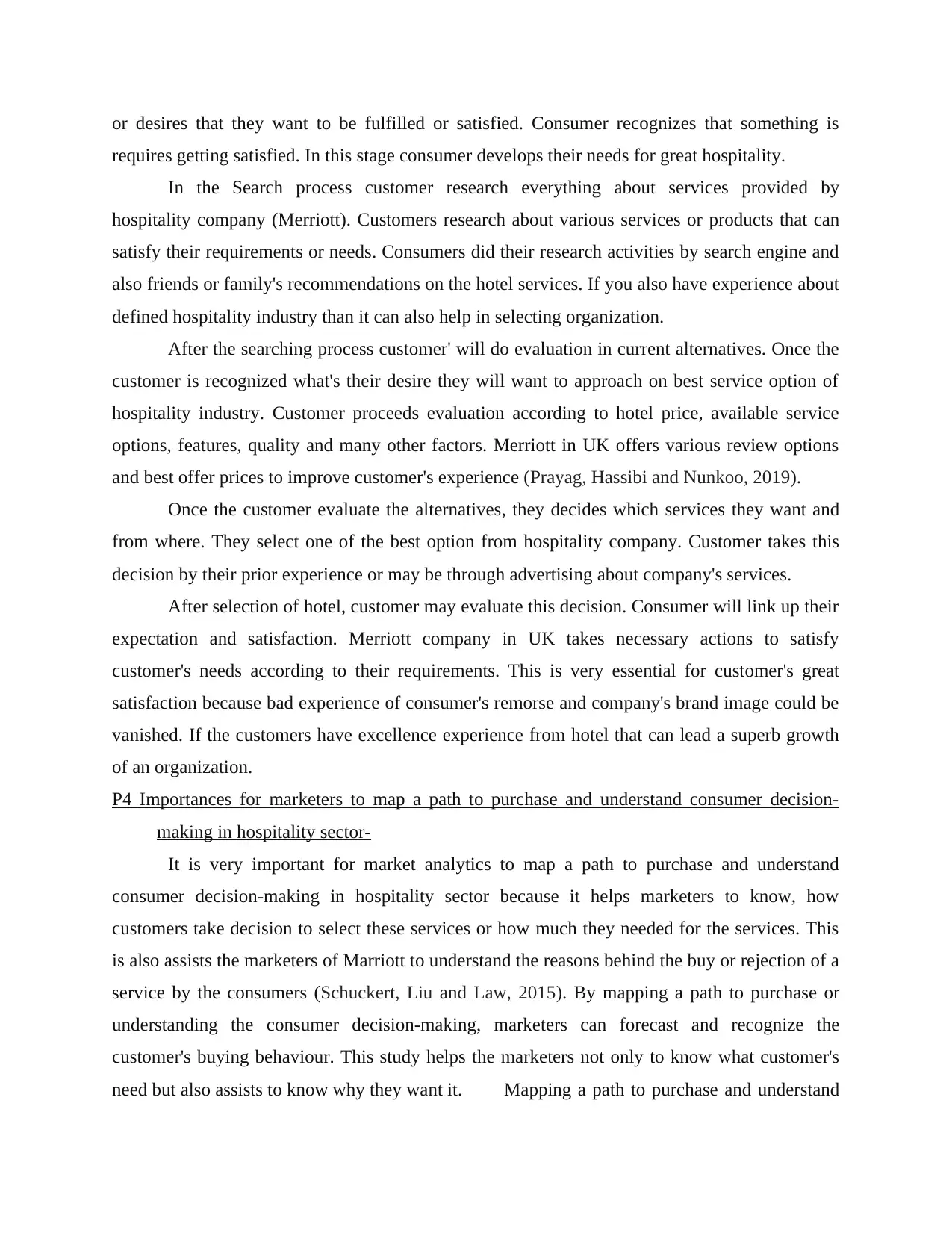
or desires that they want to be fulfilled or satisfied. Consumer recognizes that something is
requires getting satisfied. In this stage consumer develops their needs for great hospitality.
In the Search process customer research everything about services provided by
hospitality company (Merriott). Customers research about various services or products that can
satisfy their requirements or needs. Consumers did their research activities by search engine and
also friends or family's recommendations on the hotel services. If you also have experience about
defined hospitality industry than it can also help in selecting organization.
After the searching process customer' will do evaluation in current alternatives. Once the
customer is recognized what's their desire they will want to approach on best service option of
hospitality industry. Customer proceeds evaluation according to hotel price, available service
options, features, quality and many other factors. Merriott in UK offers various review options
and best offer prices to improve customer's experience (Prayag, Hassibi and Nunkoo, 2019).
Once the customer evaluate the alternatives, they decides which services they want and
from where. They select one of the best option from hospitality company. Customer takes this
decision by their prior experience or may be through advertising about company's services.
After selection of hotel, customer may evaluate this decision. Consumer will link up their
expectation and satisfaction. Merriott company in UK takes necessary actions to satisfy
customer's needs according to their requirements. This is very essential for customer's great
satisfaction because bad experience of consumer's remorse and company's brand image could be
vanished. If the customers have excellence experience from hotel that can lead a superb growth
of an organization.
P4 Importances for marketers to map a path to purchase and understand consumer decision-
making in hospitality sector-
It is very important for market analytics to map a path to purchase and understand
consumer decision-making in hospitality sector because it helps marketers to know, how
customers take decision to select these services or how much they needed for the services. This
is also assists the marketers of Marriott to understand the reasons behind the buy or rejection of a
service by the consumers (Schuckert, Liu and Law, 2015). By mapping a path to purchase or
understanding the consumer decision-making, marketers can forecast and recognize the
customer's buying behaviour. This study helps the marketers not only to know what customer's
need but also assists to know why they want it. Mapping a path to purchase and understand
requires getting satisfied. In this stage consumer develops their needs for great hospitality.
In the Search process customer research everything about services provided by
hospitality company (Merriott). Customers research about various services or products that can
satisfy their requirements or needs. Consumers did their research activities by search engine and
also friends or family's recommendations on the hotel services. If you also have experience about
defined hospitality industry than it can also help in selecting organization.
After the searching process customer' will do evaluation in current alternatives. Once the
customer is recognized what's their desire they will want to approach on best service option of
hospitality industry. Customer proceeds evaluation according to hotel price, available service
options, features, quality and many other factors. Merriott in UK offers various review options
and best offer prices to improve customer's experience (Prayag, Hassibi and Nunkoo, 2019).
Once the customer evaluate the alternatives, they decides which services they want and
from where. They select one of the best option from hospitality company. Customer takes this
decision by their prior experience or may be through advertising about company's services.
After selection of hotel, customer may evaluate this decision. Consumer will link up their
expectation and satisfaction. Merriott company in UK takes necessary actions to satisfy
customer's needs according to their requirements. This is very essential for customer's great
satisfaction because bad experience of consumer's remorse and company's brand image could be
vanished. If the customers have excellence experience from hotel that can lead a superb growth
of an organization.
P4 Importances for marketers to map a path to purchase and understand consumer decision-
making in hospitality sector-
It is very important for market analytics to map a path to purchase and understand
consumer decision-making in hospitality sector because it helps marketers to know, how
customers take decision to select these services or how much they needed for the services. This
is also assists the marketers of Marriott to understand the reasons behind the buy or rejection of a
service by the consumers (Schuckert, Liu and Law, 2015). By mapping a path to purchase or
understanding the consumer decision-making, marketers can forecast and recognize the
customer's buying behaviour. This study helps the marketers not only to know what customer's
need but also assists to know why they want it. Mapping a path to purchase and understand
⊘ This is a preview!⊘
Do you want full access?
Subscribe today to unlock all pages.

Trusted by 1+ million students worldwide
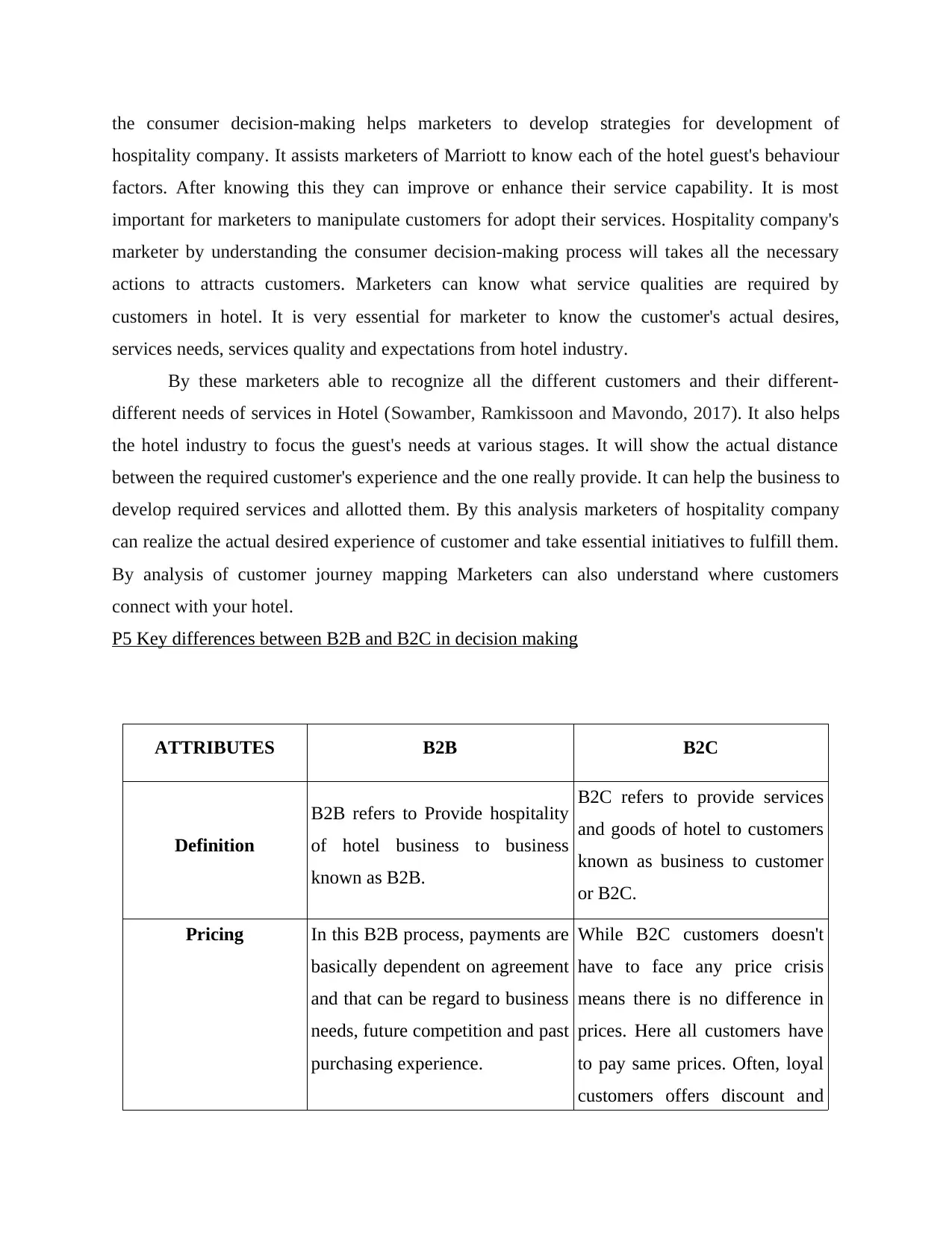
the consumer decision-making helps marketers to develop strategies for development of
hospitality company. It assists marketers of Marriott to know each of the hotel guest's behaviour
factors. After knowing this they can improve or enhance their service capability. It is most
important for marketers to manipulate customers for adopt their services. Hospitality company's
marketer by understanding the consumer decision-making process will takes all the necessary
actions to attracts customers. Marketers can know what service qualities are required by
customers in hotel. It is very essential for marketer to know the customer's actual desires,
services needs, services quality and expectations from hotel industry.
By these marketers able to recognize all the different customers and their different-
different needs of services in Hotel (Sowamber, Ramkissoon and Mavondo, 2017). It also helps
the hotel industry to focus the guest's needs at various stages. It will show the actual distance
between the required customer's experience and the one really provide. It can help the business to
develop required services and allotted them. By this analysis marketers of hospitality company
can realize the actual desired experience of customer and take essential initiatives to fulfill them.
By analysis of customer journey mapping Marketers can also understand where customers
connect with your hotel.
P5 Key differences between B2B and B2C in decision making
ATTRIBUTES B2B B2C
Definition
B2B refers to Provide hospitality
of hotel business to business
known as B2B.
B2C refers to provide services
and goods of hotel to customers
known as business to customer
or B2C.
Pricing In this B2B process, payments are
basically dependent on agreement
and that can be regard to business
needs, future competition and past
purchasing experience.
While B2C customers doesn't
have to face any price crisis
means there is no difference in
prices. Here all customers have
to pay same prices. Often, loyal
customers offers discount and
hospitality company. It assists marketers of Marriott to know each of the hotel guest's behaviour
factors. After knowing this they can improve or enhance their service capability. It is most
important for marketers to manipulate customers for adopt their services. Hospitality company's
marketer by understanding the consumer decision-making process will takes all the necessary
actions to attracts customers. Marketers can know what service qualities are required by
customers in hotel. It is very essential for marketer to know the customer's actual desires,
services needs, services quality and expectations from hotel industry.
By these marketers able to recognize all the different customers and their different-
different needs of services in Hotel (Sowamber, Ramkissoon and Mavondo, 2017). It also helps
the hotel industry to focus the guest's needs at various stages. It will show the actual distance
between the required customer's experience and the one really provide. It can help the business to
develop required services and allotted them. By this analysis marketers of hospitality company
can realize the actual desired experience of customer and take essential initiatives to fulfill them.
By analysis of customer journey mapping Marketers can also understand where customers
connect with your hotel.
P5 Key differences between B2B and B2C in decision making
ATTRIBUTES B2B B2C
Definition
B2B refers to Provide hospitality
of hotel business to business
known as B2B.
B2C refers to provide services
and goods of hotel to customers
known as business to customer
or B2C.
Pricing In this B2B process, payments are
basically dependent on agreement
and that can be regard to business
needs, future competition and past
purchasing experience.
While B2C customers doesn't
have to face any price crisis
means there is no difference in
prices. Here all customers have
to pay same prices. Often, loyal
customers offers discount and
Paraphrase This Document
Need a fresh take? Get an instant paraphrase of this document with our AI Paraphraser
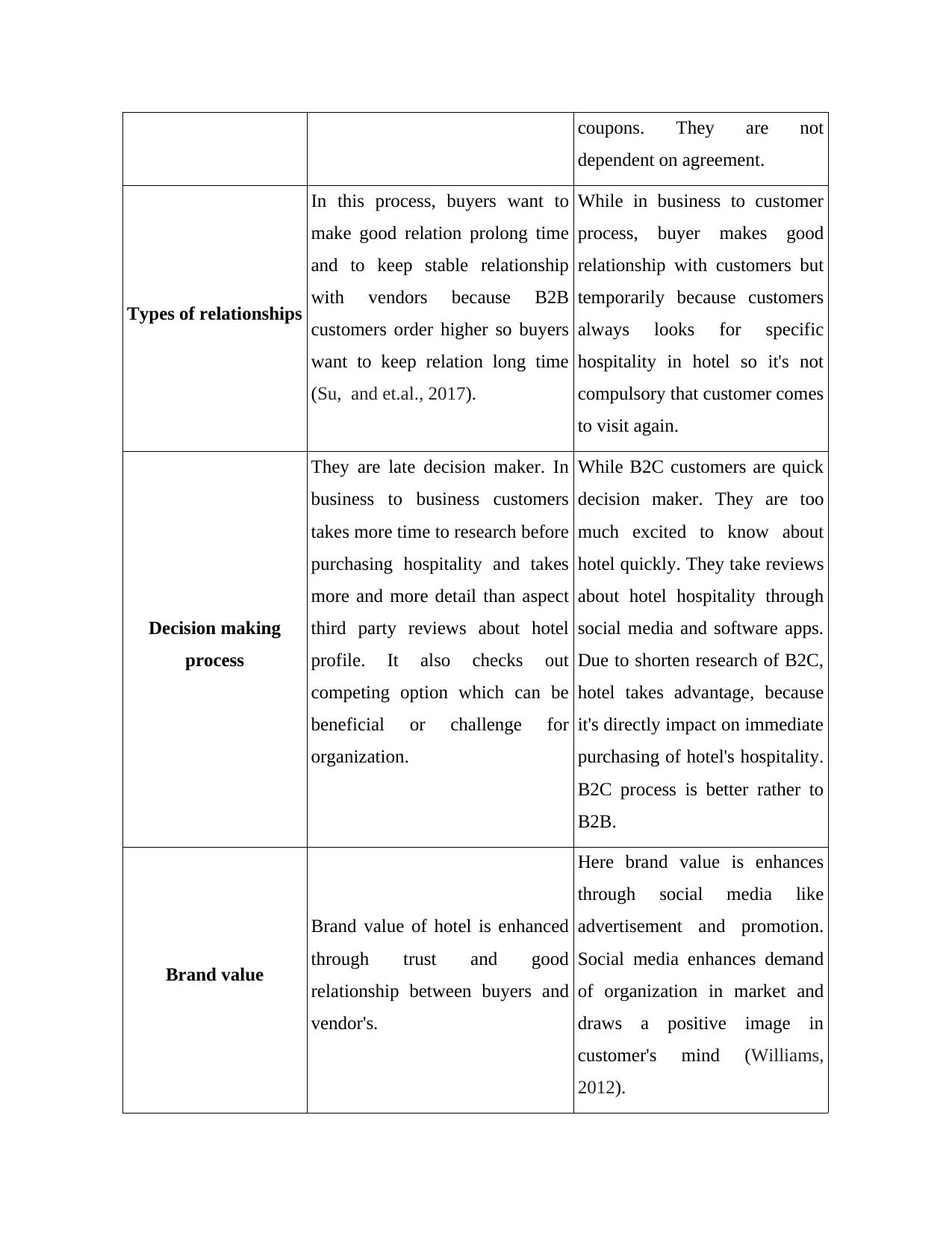
coupons. They are not
dependent on agreement.
Types of relationships
In this process, buyers want to
make good relation prolong time
and to keep stable relationship
with vendors because B2B
customers order higher so buyers
want to keep relation long time
(Su, and et.al., 2017).
While in business to customer
process, buyer makes good
relationship with customers but
temporarily because customers
always looks for specific
hospitality in hotel so it's not
compulsory that customer comes
to visit again.
Decision making
process
They are late decision maker. In
business to business customers
takes more time to research before
purchasing hospitality and takes
more and more detail than aspect
third party reviews about hotel
profile. It also checks out
competing option which can be
beneficial or challenge for
organization.
While B2C customers are quick
decision maker. They are too
much excited to know about
hotel quickly. They take reviews
about hotel hospitality through
social media and software apps.
Due to shorten research of B2C,
hotel takes advantage, because
it's directly impact on immediate
purchasing of hotel's hospitality.
B2C process is better rather to
B2B.
Brand value
Brand value of hotel is enhanced
through trust and good
relationship between buyers and
vendor's.
Here brand value is enhances
through social media like
advertisement and promotion.
Social media enhances demand
of organization in market and
draws a positive image in
customer's mind (Williams,
2012).
dependent on agreement.
Types of relationships
In this process, buyers want to
make good relation prolong time
and to keep stable relationship
with vendors because B2B
customers order higher so buyers
want to keep relation long time
(Su, and et.al., 2017).
While in business to customer
process, buyer makes good
relationship with customers but
temporarily because customers
always looks for specific
hospitality in hotel so it's not
compulsory that customer comes
to visit again.
Decision making
process
They are late decision maker. In
business to business customers
takes more time to research before
purchasing hospitality and takes
more and more detail than aspect
third party reviews about hotel
profile. It also checks out
competing option which can be
beneficial or challenge for
organization.
While B2C customers are quick
decision maker. They are too
much excited to know about
hotel quickly. They take reviews
about hotel hospitality through
social media and software apps.
Due to shorten research of B2C,
hotel takes advantage, because
it's directly impact on immediate
purchasing of hotel's hospitality.
B2C process is better rather to
B2B.
Brand value
Brand value of hotel is enhanced
through trust and good
relationship between buyers and
vendor's.
Here brand value is enhances
through social media like
advertisement and promotion.
Social media enhances demand
of organization in market and
draws a positive image in
customer's mind (Williams,
2012).
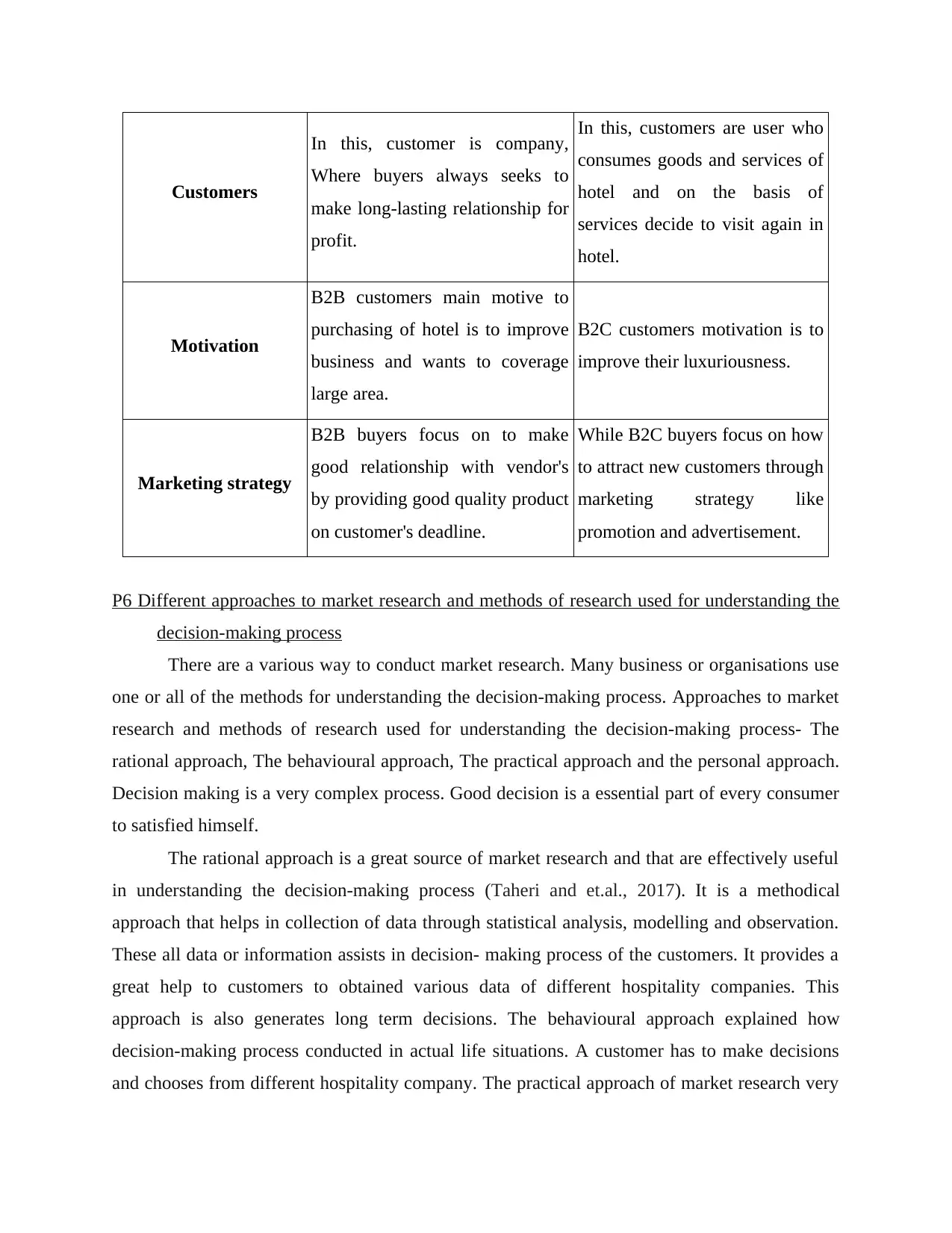
Customers
In this, customer is company,
Where buyers always seeks to
make long-lasting relationship for
profit.
In this, customers are user who
consumes goods and services of
hotel and on the basis of
services decide to visit again in
hotel.
Motivation
B2B customers main motive to
purchasing of hotel is to improve
business and wants to coverage
large area.
B2C customers motivation is to
improve their luxuriousness.
Marketing strategy
B2B buyers focus on to make
good relationship with vendor's
by providing good quality product
on customer's deadline.
While B2C buyers focus on how
to attract new customers through
marketing strategy like
promotion and advertisement.
P6 Different approaches to market research and methods of research used for understanding the
decision-making process
There are a various way to conduct market research. Many business or organisations use
one or all of the methods for understanding the decision-making process. Approaches to market
research and methods of research used for understanding the decision-making process- The
rational approach, The behavioural approach, The practical approach and the personal approach.
Decision making is a very complex process. Good decision is a essential part of every consumer
to satisfied himself.
The rational approach is a great source of market research and that are effectively useful
in understanding the decision-making process (Taheri and et.al., 2017). It is a methodical
approach that helps in collection of data through statistical analysis, modelling and observation.
These all data or information assists in decision- making process of the customers. It provides a
great help to customers to obtained various data of different hospitality companies. This
approach is also generates long term decisions. The behavioural approach explained how
decision-making process conducted in actual life situations. A customer has to make decisions
and chooses from different hospitality company. The practical approach of market research very
In this, customer is company,
Where buyers always seeks to
make long-lasting relationship for
profit.
In this, customers are user who
consumes goods and services of
hotel and on the basis of
services decide to visit again in
hotel.
Motivation
B2B customers main motive to
purchasing of hotel is to improve
business and wants to coverage
large area.
B2C customers motivation is to
improve their luxuriousness.
Marketing strategy
B2B buyers focus on to make
good relationship with vendor's
by providing good quality product
on customer's deadline.
While B2C buyers focus on how
to attract new customers through
marketing strategy like
promotion and advertisement.
P6 Different approaches to market research and methods of research used for understanding the
decision-making process
There are a various way to conduct market research. Many business or organisations use
one or all of the methods for understanding the decision-making process. Approaches to market
research and methods of research used for understanding the decision-making process- The
rational approach, The behavioural approach, The practical approach and the personal approach.
Decision making is a very complex process. Good decision is a essential part of every consumer
to satisfied himself.
The rational approach is a great source of market research and that are effectively useful
in understanding the decision-making process (Taheri and et.al., 2017). It is a methodical
approach that helps in collection of data through statistical analysis, modelling and observation.
These all data or information assists in decision- making process of the customers. It provides a
great help to customers to obtained various data of different hospitality companies. This
approach is also generates long term decisions. The behavioural approach explained how
decision-making process conducted in actual life situations. A customer has to make decisions
and chooses from different hospitality company. The practical approach of market research very
⊘ This is a preview!⊘
Do you want full access?
Subscribe today to unlock all pages.

Trusted by 1+ million students worldwide
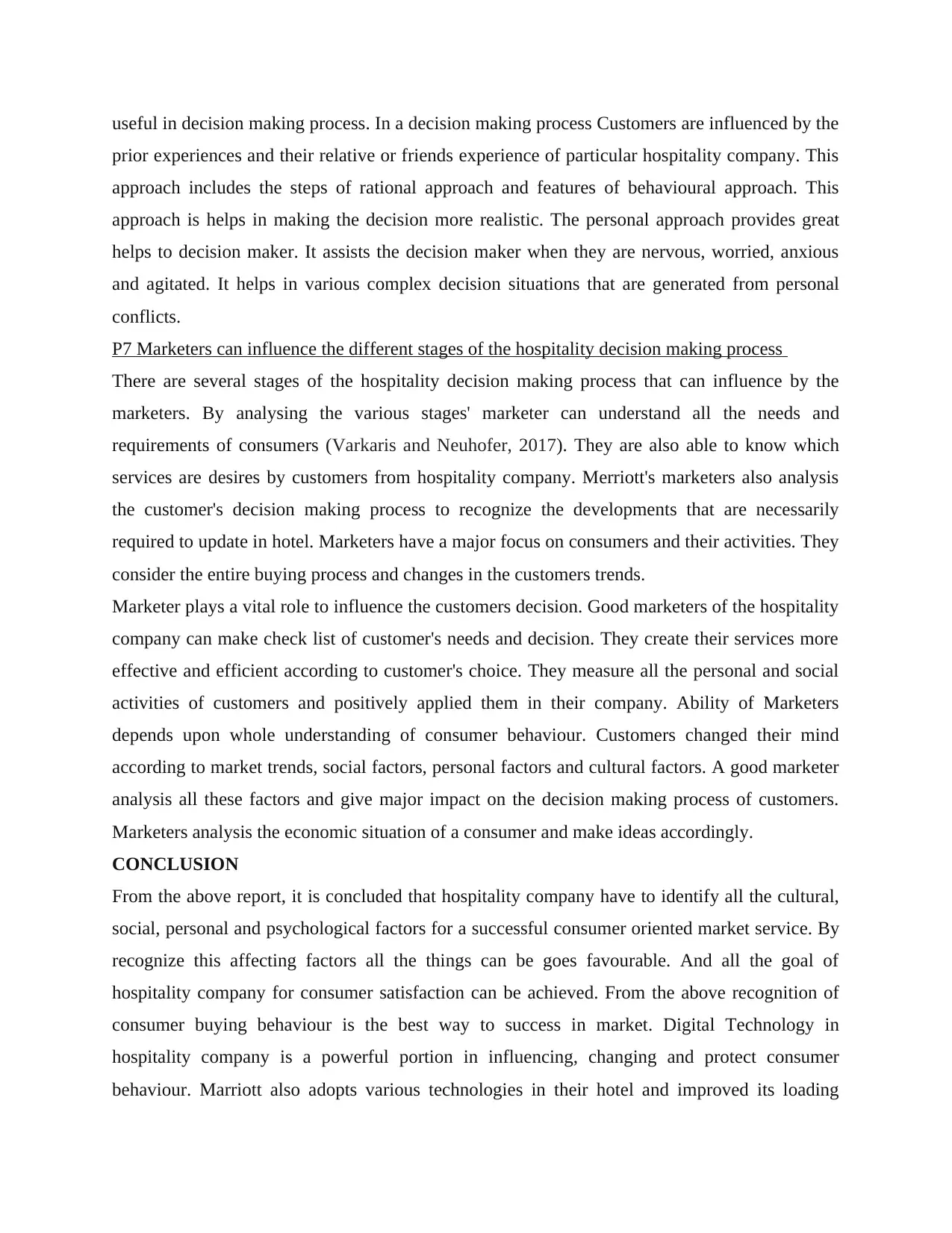
useful in decision making process. In a decision making process Customers are influenced by the
prior experiences and their relative or friends experience of particular hospitality company. This
approach includes the steps of rational approach and features of behavioural approach. This
approach is helps in making the decision more realistic. The personal approach provides great
helps to decision maker. It assists the decision maker when they are nervous, worried, anxious
and agitated. It helps in various complex decision situations that are generated from personal
conflicts.
P7 Marketers can influence the different stages of the hospitality decision making process
There are several stages of the hospitality decision making process that can influence by the
marketers. By analysing the various stages' marketer can understand all the needs and
requirements of consumers (Varkaris and Neuhofer, 2017). They are also able to know which
services are desires by customers from hospitality company. Merriott's marketers also analysis
the customer's decision making process to recognize the developments that are necessarily
required to update in hotel. Marketers have a major focus on consumers and their activities. They
consider the entire buying process and changes in the customers trends.
Marketer plays a vital role to influence the customers decision. Good marketers of the hospitality
company can make check list of customer's needs and decision. They create their services more
effective and efficient according to customer's choice. They measure all the personal and social
activities of customers and positively applied them in their company. Ability of Marketers
depends upon whole understanding of consumer behaviour. Customers changed their mind
according to market trends, social factors, personal factors and cultural factors. A good marketer
analysis all these factors and give major impact on the decision making process of customers.
Marketers analysis the economic situation of a consumer and make ideas accordingly.
CONCLUSION
From the above report, it is concluded that hospitality company have to identify all the cultural,
social, personal and psychological factors for a successful consumer oriented market service. By
recognize this affecting factors all the things can be goes favourable. And all the goal of
hospitality company for consumer satisfaction can be achieved. From the above recognition of
consumer buying behaviour is the best way to success in market. Digital Technology in
hospitality company is a powerful portion in influencing, changing and protect consumer
behaviour. Marriott also adopts various technologies in their hotel and improved its loading
prior experiences and their relative or friends experience of particular hospitality company. This
approach includes the steps of rational approach and features of behavioural approach. This
approach is helps in making the decision more realistic. The personal approach provides great
helps to decision maker. It assists the decision maker when they are nervous, worried, anxious
and agitated. It helps in various complex decision situations that are generated from personal
conflicts.
P7 Marketers can influence the different stages of the hospitality decision making process
There are several stages of the hospitality decision making process that can influence by the
marketers. By analysing the various stages' marketer can understand all the needs and
requirements of consumers (Varkaris and Neuhofer, 2017). They are also able to know which
services are desires by customers from hospitality company. Merriott's marketers also analysis
the customer's decision making process to recognize the developments that are necessarily
required to update in hotel. Marketers have a major focus on consumers and their activities. They
consider the entire buying process and changes in the customers trends.
Marketer plays a vital role to influence the customers decision. Good marketers of the hospitality
company can make check list of customer's needs and decision. They create their services more
effective and efficient according to customer's choice. They measure all the personal and social
activities of customers and positively applied them in their company. Ability of Marketers
depends upon whole understanding of consumer behaviour. Customers changed their mind
according to market trends, social factors, personal factors and cultural factors. A good marketer
analysis all these factors and give major impact on the decision making process of customers.
Marketers analysis the economic situation of a consumer and make ideas accordingly.
CONCLUSION
From the above report, it is concluded that hospitality company have to identify all the cultural,
social, personal and psychological factors for a successful consumer oriented market service. By
recognize this affecting factors all the things can be goes favourable. And all the goal of
hospitality company for consumer satisfaction can be achieved. From the above recognition of
consumer buying behaviour is the best way to success in market. Digital Technology in
hospitality company is a powerful portion in influencing, changing and protect consumer
behaviour. Marriott also adopts various technologies in their hotel and improved its loading
Paraphrase This Document
Need a fresh take? Get an instant paraphrase of this document with our AI Paraphraser
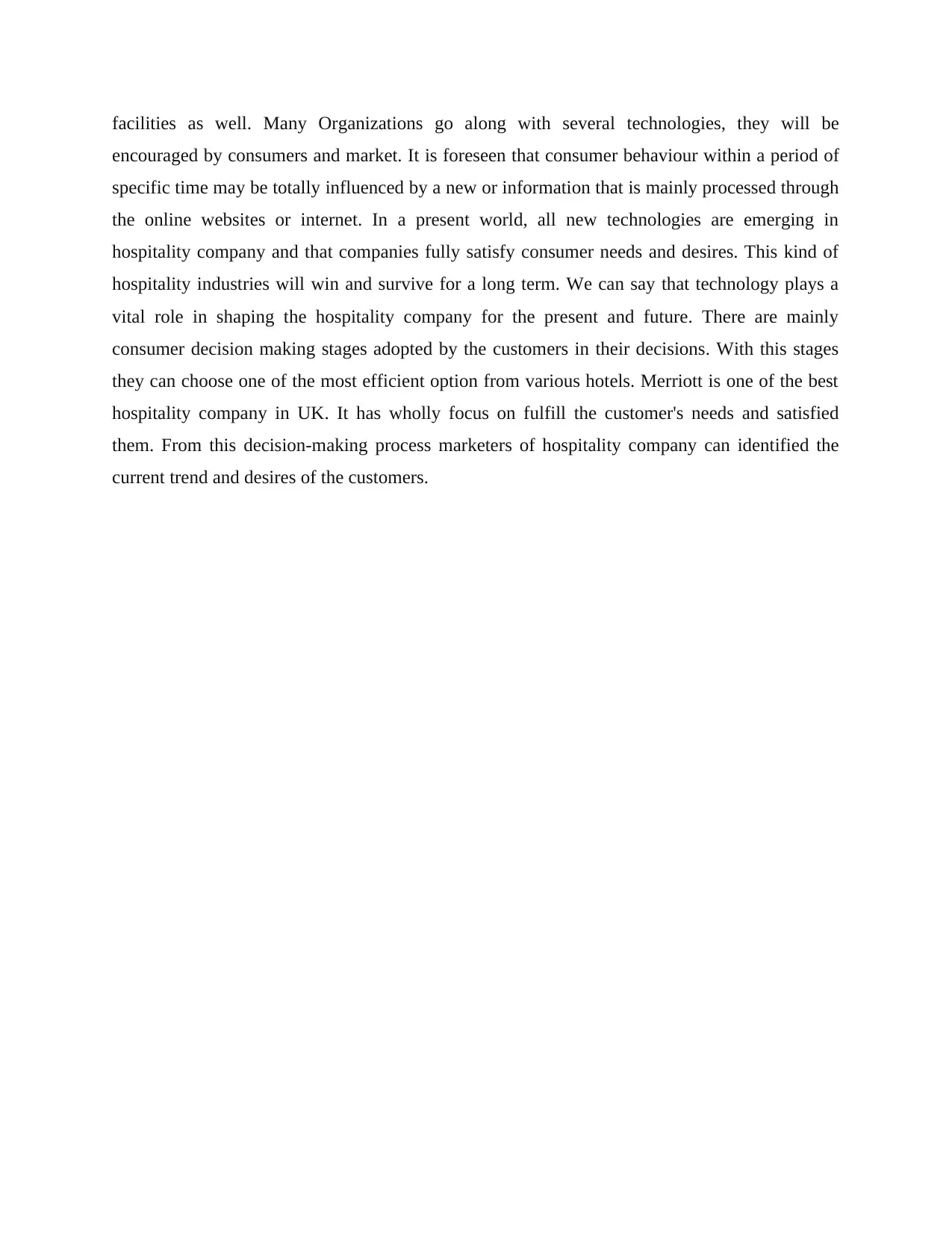
facilities as well. Many Organizations go along with several technologies, they will be
encouraged by consumers and market. It is foreseen that consumer behaviour within a period of
specific time may be totally influenced by a new or information that is mainly processed through
the online websites or internet. In a present world, all new technologies are emerging in
hospitality company and that companies fully satisfy consumer needs and desires. This kind of
hospitality industries will win and survive for a long term. We can say that technology plays a
vital role in shaping the hospitality company for the present and future. There are mainly
consumer decision making stages adopted by the customers in their decisions. With this stages
they can choose one of the most efficient option from various hotels. Merriott is one of the best
hospitality company in UK. It has wholly focus on fulfill the customer's needs and satisfied
them. From this decision-making process marketers of hospitality company can identified the
current trend and desires of the customers.
encouraged by consumers and market. It is foreseen that consumer behaviour within a period of
specific time may be totally influenced by a new or information that is mainly processed through
the online websites or internet. In a present world, all new technologies are emerging in
hospitality company and that companies fully satisfy consumer needs and desires. This kind of
hospitality industries will win and survive for a long term. We can say that technology plays a
vital role in shaping the hospitality company for the present and future. There are mainly
consumer decision making stages adopted by the customers in their decisions. With this stages
they can choose one of the most efficient option from various hotels. Merriott is one of the best
hospitality company in UK. It has wholly focus on fulfill the customer's needs and satisfied
them. From this decision-making process marketers of hospitality company can identified the
current trend and desires of the customers.
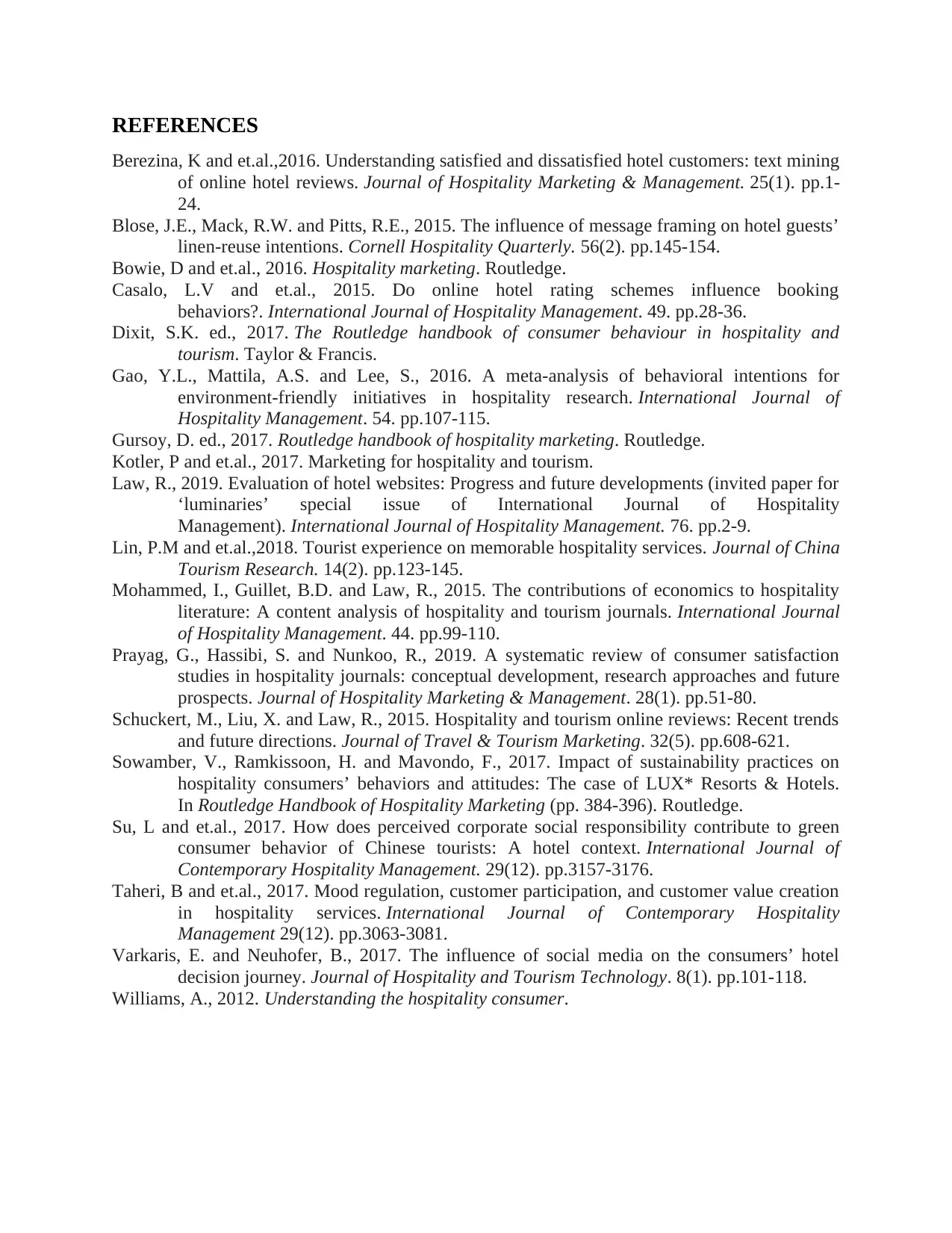
REFERENCES
Berezina, K and et.al.,2016. Understanding satisfied and dissatisfied hotel customers: text mining
of online hotel reviews. Journal of Hospitality Marketing & Management. 25(1). pp.1-
24.
Blose, J.E., Mack, R.W. and Pitts, R.E., 2015. The influence of message framing on hotel guests’
linen-reuse intentions. Cornell Hospitality Quarterly. 56(2). pp.145-154.
Bowie, D and et.al., 2016. Hospitality marketing. Routledge.
Casalo, L.V and et.al., 2015. Do online hotel rating schemes influence booking
behaviors?. International Journal of Hospitality Management. 49. pp.28-36.
Dixit, S.K. ed., 2017. The Routledge handbook of consumer behaviour in hospitality and
tourism. Taylor & Francis.
Gao, Y.L., Mattila, A.S. and Lee, S., 2016. A meta-analysis of behavioral intentions for
environment-friendly initiatives in hospitality research. International Journal of
Hospitality Management. 54. pp.107-115.
Gursoy, D. ed., 2017. Routledge handbook of hospitality marketing. Routledge.
Kotler, P and et.al., 2017. Marketing for hospitality and tourism.
Law, R., 2019. Evaluation of hotel websites: Progress and future developments (invited paper for
‘luminaries’ special issue of International Journal of Hospitality
Management). International Journal of Hospitality Management. 76. pp.2-9.
Lin, P.M and et.al.,2018. Tourist experience on memorable hospitality services. Journal of China
Tourism Research. 14(2). pp.123-145.
Mohammed, I., Guillet, B.D. and Law, R., 2015. The contributions of economics to hospitality
literature: A content analysis of hospitality and tourism journals. International Journal
of Hospitality Management. 44. pp.99-110.
Prayag, G., Hassibi, S. and Nunkoo, R., 2019. A systematic review of consumer satisfaction
studies in hospitality journals: conceptual development, research approaches and future
prospects. Journal of Hospitality Marketing & Management. 28(1). pp.51-80.
Schuckert, M., Liu, X. and Law, R., 2015. Hospitality and tourism online reviews: Recent trends
and future directions. Journal of Travel & Tourism Marketing. 32(5). pp.608-621.
Sowamber, V., Ramkissoon, H. and Mavondo, F., 2017. Impact of sustainability practices on
hospitality consumers’ behaviors and attitudes: The case of LUX* Resorts & Hotels.
In Routledge Handbook of Hospitality Marketing (pp. 384-396). Routledge.
Su, L and et.al., 2017. How does perceived corporate social responsibility contribute to green
consumer behavior of Chinese tourists: A hotel context. International Journal of
Contemporary Hospitality Management. 29(12). pp.3157-3176.
Taheri, B and et.al., 2017. Mood regulation, customer participation, and customer value creation
in hospitality services. International Journal of Contemporary Hospitality
Management 29(12). pp.3063-3081.
Varkaris, E. and Neuhofer, B., 2017. The influence of social media on the consumers’ hotel
decision journey. Journal of Hospitality and Tourism Technology. 8(1). pp.101-118.
Williams, A., 2012. Understanding the hospitality consumer.
Berezina, K and et.al.,2016. Understanding satisfied and dissatisfied hotel customers: text mining
of online hotel reviews. Journal of Hospitality Marketing & Management. 25(1). pp.1-
24.
Blose, J.E., Mack, R.W. and Pitts, R.E., 2015. The influence of message framing on hotel guests’
linen-reuse intentions. Cornell Hospitality Quarterly. 56(2). pp.145-154.
Bowie, D and et.al., 2016. Hospitality marketing. Routledge.
Casalo, L.V and et.al., 2015. Do online hotel rating schemes influence booking
behaviors?. International Journal of Hospitality Management. 49. pp.28-36.
Dixit, S.K. ed., 2017. The Routledge handbook of consumer behaviour in hospitality and
tourism. Taylor & Francis.
Gao, Y.L., Mattila, A.S. and Lee, S., 2016. A meta-analysis of behavioral intentions for
environment-friendly initiatives in hospitality research. International Journal of
Hospitality Management. 54. pp.107-115.
Gursoy, D. ed., 2017. Routledge handbook of hospitality marketing. Routledge.
Kotler, P and et.al., 2017. Marketing for hospitality and tourism.
Law, R., 2019. Evaluation of hotel websites: Progress and future developments (invited paper for
‘luminaries’ special issue of International Journal of Hospitality
Management). International Journal of Hospitality Management. 76. pp.2-9.
Lin, P.M and et.al.,2018. Tourist experience on memorable hospitality services. Journal of China
Tourism Research. 14(2). pp.123-145.
Mohammed, I., Guillet, B.D. and Law, R., 2015. The contributions of economics to hospitality
literature: A content analysis of hospitality and tourism journals. International Journal
of Hospitality Management. 44. pp.99-110.
Prayag, G., Hassibi, S. and Nunkoo, R., 2019. A systematic review of consumer satisfaction
studies in hospitality journals: conceptual development, research approaches and future
prospects. Journal of Hospitality Marketing & Management. 28(1). pp.51-80.
Schuckert, M., Liu, X. and Law, R., 2015. Hospitality and tourism online reviews: Recent trends
and future directions. Journal of Travel & Tourism Marketing. 32(5). pp.608-621.
Sowamber, V., Ramkissoon, H. and Mavondo, F., 2017. Impact of sustainability practices on
hospitality consumers’ behaviors and attitudes: The case of LUX* Resorts & Hotels.
In Routledge Handbook of Hospitality Marketing (pp. 384-396). Routledge.
Su, L and et.al., 2017. How does perceived corporate social responsibility contribute to green
consumer behavior of Chinese tourists: A hotel context. International Journal of
Contemporary Hospitality Management. 29(12). pp.3157-3176.
Taheri, B and et.al., 2017. Mood regulation, customer participation, and customer value creation
in hospitality services. International Journal of Contemporary Hospitality
Management 29(12). pp.3063-3081.
Varkaris, E. and Neuhofer, B., 2017. The influence of social media on the consumers’ hotel
decision journey. Journal of Hospitality and Tourism Technology. 8(1). pp.101-118.
Williams, A., 2012. Understanding the hospitality consumer.
⊘ This is a preview!⊘
Do you want full access?
Subscribe today to unlock all pages.

Trusted by 1+ million students worldwide
1 out of 12
Related Documents
Your All-in-One AI-Powered Toolkit for Academic Success.
+13062052269
info@desklib.com
Available 24*7 on WhatsApp / Email
![[object Object]](/_next/static/media/star-bottom.7253800d.svg)
Unlock your academic potential
Copyright © 2020–2026 A2Z Services. All Rights Reserved. Developed and managed by ZUCOL.


